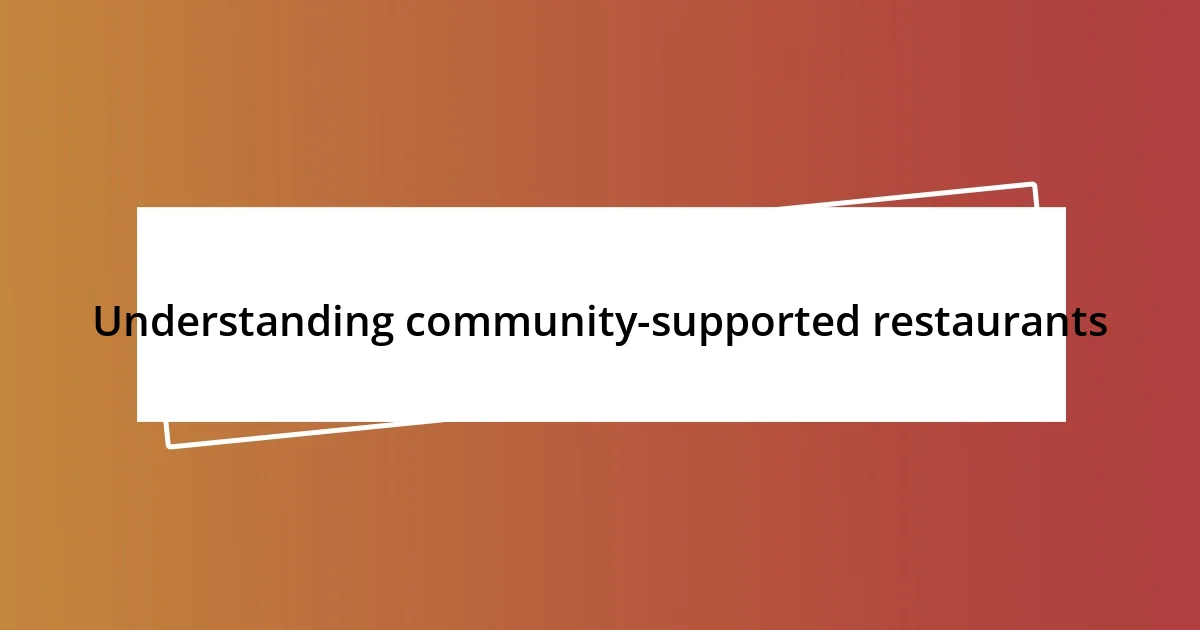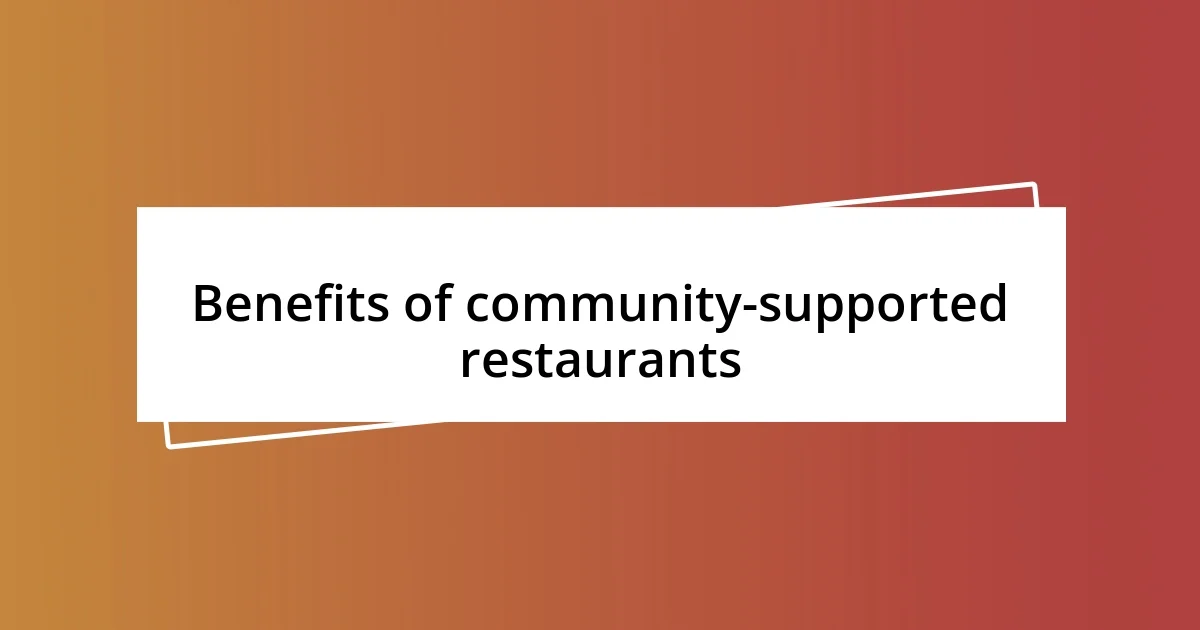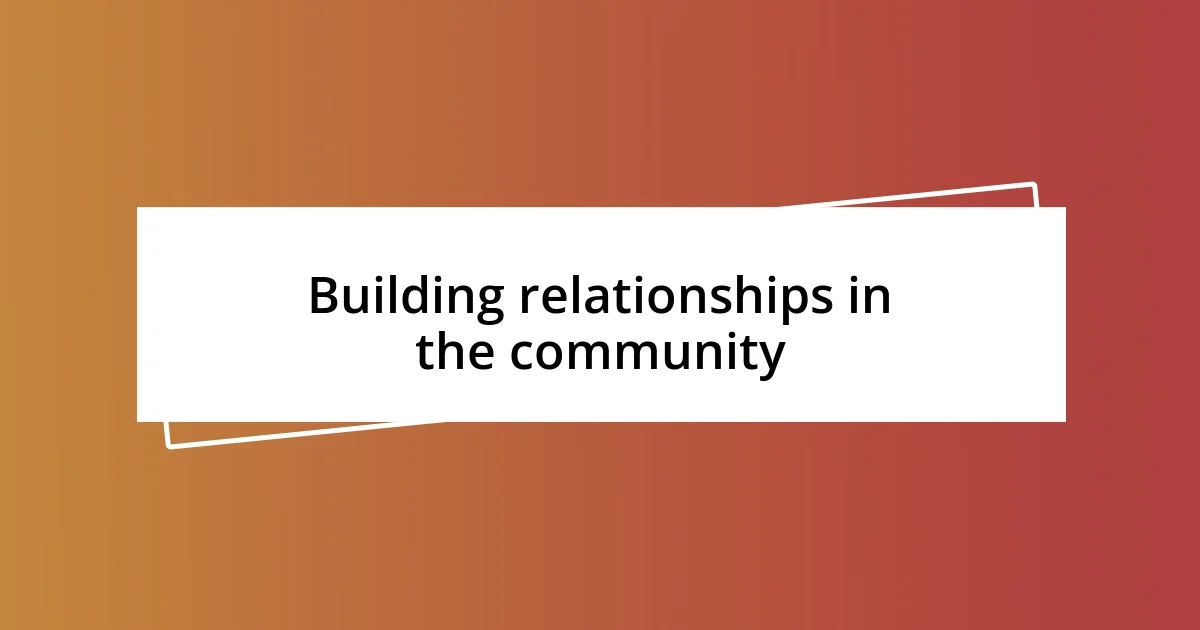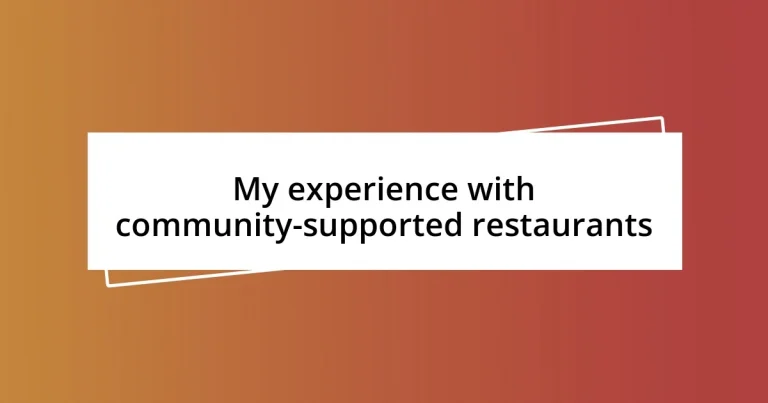Key takeaways:
- Community-supported restaurants (CSRs) enhance local dining experiences by connecting diners with farmers and fostering a sense of belonging through shared meals and community events.
- CSRs prioritize fresh, seasonal ingredients and sustainability, creating a positive environmental impact and deepening community engagement.
- Personal interactions with staff in CSRs enrich the dining experience, allowing for meaningful conversations and storytelling that promote appreciation for food and local agriculture.

Understanding community-supported restaurants
Community-supported restaurants (CSRs) are a unique model that directly connects diners with local food communities. I remember the first time I stepped into a CSR; the vibrant atmosphere was palpable, and the sense of belonging struck me immediately. It dawned on me how crucial these establishments are for supporting local farmers and artisans while allowing consumers to have a genuine stake in their dining experiences.
What truly sets CSRs apart is their focus on shared ownership and sustainability. Imagine knowing that your dining dollars are directly supporting the farmers who grow your food. This idea resonates deeply with me, as I often reflect on the satisfaction I feel when I can trace my meal back to its source. It makes the food come alive in a different way, doesn’t it?
Participating in a CSR is like being part of a bigger family. I recall a potluck-style event hosted by a local CSR where everyone brought a dish made from the ingredients provided by nearby farmers. Sharing our stories over meals made from the same crops created a bond that felt heartwarming and unifying. Can you think of a dining experience that made you feel similarly connected? These moments are what enrich our lives and strengthen communities, reinforcing why I’m such a fan of the CSR model.

Benefits of community-supported restaurants
Participating in community-supported restaurants comes with a multitude of benefits. One of the most striking aspects for me is the fresh, seasonally-focused menu that reflects the local harvest. The first time I enjoyed a dish made from just-picked vegetables, I couldn’t help but appreciate the explosion of flavors compared to the generic options I often encountered at chain restaurants. It’s like a direct line to the earth with every bite!
Moreover, CSRs foster a deep sense of community engagement. I recall attending a farmers’ market held in conjunction with a local CSR, where community members gathered not just to shop, but to connect and collaborate. It was a reminder that our shared love for food and local businesses can weave us closer together, creating a support network that benefits everyone involved. Isn’t it rewarding to know that your dining choices extend beyond just satisfaction to cultivating local relationships?
On a broader scale, the environmental benefits are incredibly impactful as well. Since many CSRs prioritize sourcing from within a short radius, they minimize transportation emissions, which is something I care deeply about. It felt empowering to support a restaurant that views sustainability as a core value rather than an afterthought. Eating here echoed my commitment to reducing my carbon footprint while enjoying exceptional meals.
| Benefit | Description |
|---|---|
| Fresh Ingredients | Menus shift with the seasons, offering dishes that highlight local produce. |
| Community Connection | Encourage local engagement and collaboration through events and shared meals. |
| Environmental Impact | Sourcing locally reduces transportation emissions, supporting sustainability. |

Interacting with restaurant staff
Interacting with restaurant staff in a community-supported restaurant (CSR) feels different from other dining experiences. From the moment I walked in, I noticed how friendly and approachable the staff were. They genuinely seemed passionate about the food they served, and I could immediately sense their connection to the local community. I remember asking the chef about the ingredients in my dish, and instead of the usual scripted response, he enthusiastically shared stories from the farmers who grew the produce. It’s these personal interactions that make dining at a CSR unforgettable.
When I visit a CSR, I often prioritize engaging with the staff. Here’s why:
- Personal Stories: Staff share intriguing details about the meals, deepening my appreciation for the ingredients.
- Culinary Recommendations: They offer tailored suggestions that align perfectly with my tastes, enhancing my dining experience.
- Welcoming Environment: The warmth from the staff fosters a sense of connection, making me feel part of something bigger.
- Feedback Acceptance: I appreciate how staff actively seek input on the menu, showing they value my experience.
- Shared Values: I love discussing sustainability practices with them, reinforcing my commitment to supportive dining choices.
It’s interactions like these that linger in my memory long after the meal is over.

Building relationships in the community
Building relationships within the community is often one of the most gratifying aspects of dining at community-supported restaurants. I still remember my first visit to a local CSR where I had the chance to chat with fellow diners. We connected not just over our shared love for delicious food, but also exchanged stories about our favorite local farms. Isn’t it fascinating how food can spark conversations that create bonds between strangers?
Attending special events organized by these restaurants has been a key factor in nurturing these relationships. I recall a delightful evening where we gathered for a farm-to-table dinner. The chefs introduced each dish by sharing its origins, and I found myself sitting next to a farmer whose sprouted greens were featured on my plate. Sharing a meal with those behind the food not only enhanced my appreciation but also formed a collective sense of purpose. Have you ever realized that these moments can turn acquaintances into lifelong friends?
In my experience, community-supported restaurants encourage collaboration and support among locals far beyond the dining experience. I remember volunteering at a pop-up event where we served food to those in need, alongside restaurant staff and other community members. It was incredibly moving to witness how our combined efforts could serve a better purpose while reinforcing relationships that stretched beyond the table. Isn’t it inspiring how sharing food can lead to meaningful connections and mutual support in our neighborhoods?

Sharing your experiences with others
Sharing my experiences with community-supported restaurants has opened up a dialogue I didn’t expect. After a meal, I often find myself chatting with friends and family about the unique dishes and the stories behind them. It’s remarkable how these conversations not only inspire others to try out CSRs but also deepen my own understanding and appreciation of the food we consume.
I vividly recall an evening when I invited a few friends to join me at a CSR for their special taco night. As we relished each bite, I excitedly shared the story behind the organic corn used for the tortillas, which I had learned about from the staff. My friends were intrigued, leading to a lively discussion about the importance of supporting local agriculture. Moments like these can transform a simple meal into a rich tapestry of shared knowledge and enthusiasm.
Reflecting on these experiences, I realize the power of storytelling in dining. Have you ever left a restaurant wanting to tell everyone about a meal that touched your heart? That’s the kind of impact community-supported restaurants can have—it’s not just about the food; it’s about the stories and connections that we carry with us long after we’ve left the table.














